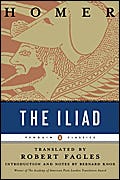If you want to know about the Trojan War, read The Iliad. Okay, it’s not really a novel, but a good prose translation will make it sound like one. If you read many of the other books on this list, you’ll find that they refer to Homer’s masterpiece again and again. These characters know about the wrath of Achilles and the grief of Priam; shouldn’t you? And don’t even try the excuse that it’s too high-brow for a fan of genre fiction. Here’s a glimpse of a boxing match held during some funeral games:
"One could hear the grinding of their teeth, and they sweated from every pore of their skin. Presently Epeüs came in and gave Eurylaus a blow on the jaw through his guard; Eurylaus could not keep his legs; they gave way under him.... But noble Epeüs caught hold of him and raised him up; his comrades also came round him and led him from the ring, unsteady in his gait, spitting clots of blood, his head hanging on one side. They set him down among them half conscious, and then went to fetch the double cup."
Could you see that scene any more clearly if Marty Scorsese had shot it in his Raging Bull-style slow motion? Homer didn’t get to be the fountainhead of Western lit by being a slouch. The Iliad is a war story, with lots of one-on-one fights to the death, desperate battles for survival, and daring night raids. It’s a tale about pride and the lure of glory, and the way small disputes spin into full-scale tragedy. There are also a bunch of interfering gods and some ornate poetic metaphors. Deal with it. There were Greeks in the time of Socrates who believed that everything you needed to know was in Homer. That was a wee bit of an overstatement, but not as bad as claiming to be educated when you’ve never read this book. (circa 800 B.C.; various editions range from 400-700 pages, not as long as it sounds, because the verse format means fewer words to a page)



